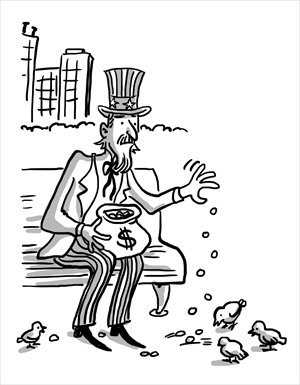Spongers are necessary price for a society that cares for deprived

US welfare recipients often get pilloried by right-wing politicians and media outlets such as Fox TV. But media mogul Rupert Murdoch - the owner of Fox - took the viciousness of the attacks to a new level last week.
In a tweet, Murdoch commented on a recent incident in which a 400-pound woman fell through a hole on a city sidewalk in New York and broke an arm. "How did fat lady who fell thru street get to 400 lbs? Welfare, stamps, etc? Then leave us all with 20yrs immense health bills," Murdoch scoffed.
The combination of his attack on obesity and welfare at the same time was too much for many. Others noted that it isn't just poor people who get fat. Some said that if food stamps are to be blamed, it is only because the levels provided are not enough for the poor to be able to afford healthy food.
In a time when the country is facing pressure to cut spending due to its astronomical government debt - now $16.4 trillion and growing - and a huge budget deficit of about $1 trillion a year, such attacks on welfare beneficiaries have become almost a daily norm.
It wasn't so long ago that Republican presidential candidate Mitt Romney blew up because he was recorded at a fundraising event dismissing 47 percent of Americans as welfare takers who had declared themselves victims and believed they were entitled to government-provided healthcare, food and housing.
These comments could easily find sympathy among immigrants from China.
Growing up in a culture that sees hard work and self-help almost as a religion, it doesn't take long for us to notice that the welfare system in the US seems to be encouraging the opposite.
Take some people I know. One woman, who advises mothers on breast-feeding, works only half the year to keep her annual income low enough to be eligible for food stamps and Medicaid, a government health insurance program for poor people.
One janitor got a government sponsored apartment in the heart of Manhattan in the second year after arriving from China, a benefit that surprised him.
This is before we even get to the welfare abusers who drive trucks through the loopholes in the system without even raising an eyebrow.
For example, some mom and pop shop owners in Chinatown get their benefits by hiding away their cash incomes. And some parents in the Bronx have even deliberately had their kids taken away by the Administration for Child Services and then had a relative adopt the kid, so the entire family can get some cash assistance for adoption.
And these are only the direct recipients who use the system. Perhaps worse and more costly to the system are those who rip it off as service providers.
Only last week, an orthopedist on Long Island, New York, pleaded guilty to helping hundreds of rail workers falsify disability claims so that they could game the railroad pension system on retirement.
Of course, I do meet people who really need help. And some of them don't always get what they need if they get into the wrong end of a bureaucratic system or get disqualified for some reason.
But it is still hard to know whether the system helps more those who are really in need or those who are not.
This can all make one very skeptical, not only about the system but also about the people who run it. Can't Americans see the obvious flaws in their welfare system, and why don't they crack down on fraud more aggressively?
These questions may find no real answers in the partisan atmosphere in the country. But if we step back and look at the welfare system from afar, things may become clearer.
It's not that Americans are blindly tolerant of crooks, but a society should always care about its deprived and underprivileged members. And no man-made policy is free from flaws.
This may mean we have to accept a certain degree of crooks as business costs rather than make the policy too tight and deter those who desperately need help.
This is, of course, only even remotely acceptable to most people when a society can afford this generosity.
When its wealth decreases, it has to tighten up on welfare programs or ordinary taxpayers may lose the incentive to work hard as their tax rates rise.
From this perspective, it's easier to understand why the US used to have an over-generous welfare system and why the constraints of the system are unavoidable now.
This can also explain why China, which hasn't had a well-established welfare system, needs to build one now - even if there are some benefits to those who don't deserve it.
The author is a New York-based journalist. rong_xiaoqing@hotmail.com